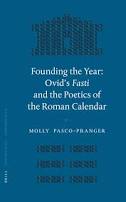Dr. Pasco-Pranger publishes and teaches on topics in ancient literature and Roman social history with special interests in gender and religion; she is also the chair of the Department of Classics.
Biography
Dr. Pasco-Pranger's doctoral dissertation focused on Ovid’s Fasti and its engagement with the Roman religious and political calendar; this research produced several articles and culminated in a book Founding the Year: Ovid’s Fasti and the Poetics of the Roman Calendar (Brill 2006). She has since published several articles on gender, writing, and desire in Roman amatory verse, and another set of articles centering on the literary and social persona of Cato the Elder. This last is connected to an ongoing research interest in masculinity and aging in ancient Rome. Her most recent article treats women’s public nudity in the early Roman empire in connection with a set of ritual contexts and social spaces.
Dr. Pasco-Pranger taught Classics at the University of Puget Sound (1998-2002) and Wesleyan University (2002-2006) before joining the University of Mississippi faculty in 2006. She is an affiliate of the Sarah Isom Center for Women and Gender Studies and has served as departmental chair since 2013. In 2018 she was awarded the Cora Lee Graham Award for Outstanding Teaching of Freshmen.
Publications

This book considers the relationship between the Fasti, Ovid's long poem on the Roman calendar, and the calendar itself, conceived of as consisting both in the rites and commemorations it organizes and in its graphic representation. The Fasti treats the calendar, recently revised by Caesar and Augustus, as its most important cultural model and as a quasi-literary 'intertext': the poem simultaneously reshapes and is itself shaped by the calendar. The study includes chapters on Book 4 and the rites of April, on the addition of Julio-Claudian holidays to the calendar, and on the final two books of the poem as shaped by the renaming of the months Quintilis and Sextilis for Julius Caesar and Augustus.
More of Dr. Pasco-Pranger's work
"With the Veil Removed: Women's Public Nudity in the Early Roman Empire," Classical Antiquity 38 (2019): 217-249.
"Speaking Stone in Catullus 55," Classical Philology 112 (2017): 89-97.
"Finding examples at home: Cato, Curius Dentatus, and the origins of Roman literary exemplarity," Classical Antiquity 34 (2015): 296-321.
"Naming Cato(s)," Classical Journal 108 (2012): 1-35.
“Duplicitous Simplicity in Ovid, Amores 1,” Classical Quarterly 62 (2012): 721-30.
"Sustaining Desire: Catullus 50, Gallus and Propertius 1.10," Classical Quarterly 59 (2009): 142-46.
“Added Days: Calendrical poetics and the Julio-Claudian holidays,” in Ovid's Fasti: Historical Readings at its Bimillennium, ed. G. Herbert-Brown (Oxford, 2002), 251-74.
“A Varronian vatic Numa?: Ovid’s Fasti and Plutarch’s Life of Numa,” 291-312 in Clio and the Poets, edd. D. Levene and D. P. Nelis (Brill, 2002).
“Vates operosus: vatic poetics and antiquarianism in Ovid’s Fasti,” Classical World 93 (2000): 275-91.
Courses Taught
- CLC 102 Introduction to Roman Civilization
- CLC 103 Women in Antiquity
- CLC 308 Survey of Roman Literature
- CLC 309 Greek and Roman Epic
- CLC 327 Greek and Roman Religions
- CLC 368 African American Literature and the Classics
Education
B.A. Latin, Oberlin College (1992)
Ph.D. Classics, University of Michigan-Ann Arbor (1998)
Our Impact
OXFORD, Miss. – More than 100 members of the University of Mississippi community gathered for dinner and conversation Sunday (Oct. 1) afternoon in the Circle at the annual Longest Table.
-
Honors & Awards

